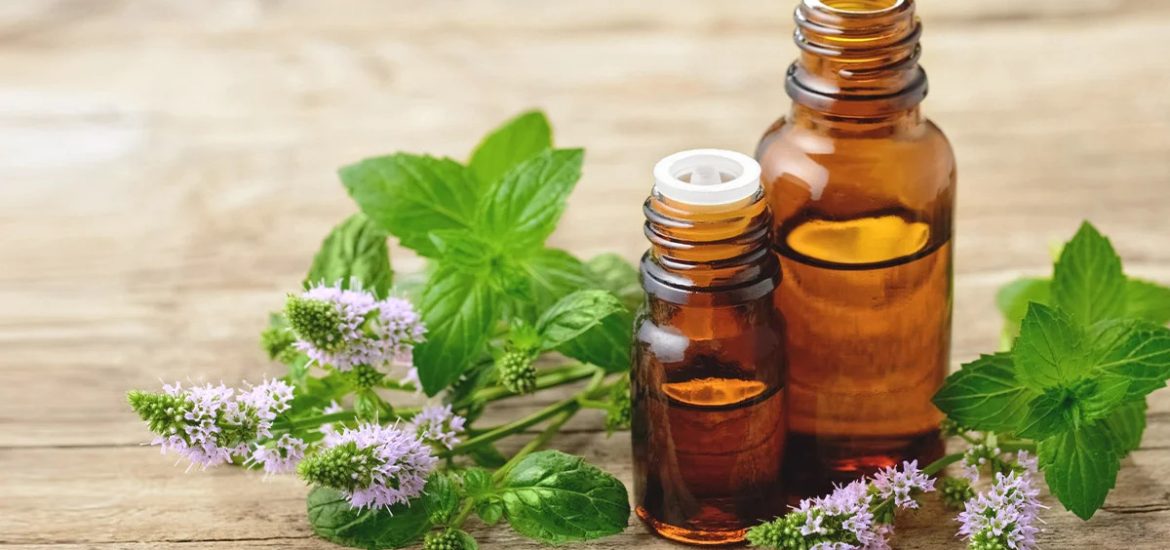Spring means beautiful flowers, pretty scenery, and colourful surroundings – all this enhanced with the melodical chirping of birds. The blossoming buds bring large quantities of pollen with them, and if you are one of the millions suffering from a hyperactive immune system, it’s bad news!
For you, pollens, spores, and mould mean runny nose, watery eyes, and wheezy breath.
Table of Contents
Allergies
Seasonal allergies are quite common around the world. People with spring allergies despise this exquisite season and prefer to spend their time indoors. Nevertheless, before you start throwing your plants and bouquets out of your house, we may have the solution you have been looking for:
Peppermint!
Peppermint is a herb with strong anti-inflammatory and anti-microbial properties. It is readily available around all parts of the world and is mostly safe to use by the general population. It is known to be the most potent herb for allergy relief and is used by people in various forms to pacify their symptoms.
Its soothing effect alleviates seasonal allergies, clears nasal passages, relieves sinuses, and helps with breathing difficulties. Peppermint also helps with skin infections, hives, and rashes (Herro & Jacob, 2010). Peppermint has rosmarinic acid, which decreases histamine levels, reducing allergy symptoms, including asthma, watery eyes, and itchy nose (Luo et al., 2020).
How to Use Peppermint for Allergies
Peppermint is locally available in general stores and herbal shops around the world. It is used in various ways, depending on availability and personal preference.
Some of the common ways to use peppermint for allergies are:
What is Peppermint Oil good for?
Peppermint oil is a versatile essential oil that has a range of potential health benefits. Here are some of the ways in which peppermint oil may be used:
- Digestive health: Peppermint oil may help relieve digestive symptoms, such as indigestion, bloating, and gas. It has a relaxing effect on the muscles of the digestive tract, which can help relieve discomfort.
- Respiratory health: Peppermint oil may help relieve respiratory symptoms, such as coughs, congestion, and sinusitis. It has a cooling and soothing effect on the respiratory tract, which can help reduce inflammation and relieve symptoms.
- Pain relief: Peppermint oil may have a pain-relieving effect, particularly for headaches and muscle pain. It has a cooling effect that can help relieve pain and reduce inflammation.
- Oral health: Peppermint oil may have a positive effect on oral health. It can help freshen breath, reduce plaque, and prevent gum disease.
- Skin health: Peppermint oil may have a soothing effect on the skin and can help relieve itching, irritation, and inflammation. It may also have a beneficial effect on acne and other skin conditions.
- Mental health: Peppermint oil may have a positive effect on mental health. It has a calming effect that can help reduce stress and anxiety. It may also improve focus and concentration.
Peppermint oil clears sinuses quickly due to its high menthol content and minty aroma. Some of the most popular ways to use peppermint oil are:
Diffusion
Peppermint oil is volatile, making it easily diffusable. Some people use air diffusers and spread the soothing oil throughout their homes. Others purchase peppermint candles or add a few drops of essential oil to any ordinary candle and enjoy their relaxing night in candlelight. You can also combine peppermint with lavender oil for a fresh, calming, and allergen-free area.
Beauty Products
If you follow social media influencers, you must be aware of the benefits of peppermint for skin care. Peppermint in beauty products can also be beneficial in relieving allergic symptoms. Using peppermint-infused bath bombs and spa products may make your skin glow, but it can also help you breathe easier.
Skin Care Routine
Another easy way to use peppermint oil for allergies is by applying it to your skin. Hives and red and itchy skin is also a sign of spring allergies. The topical administration of peppermint oil reduces itchiness in pruritis (Elsaie et al., 2016).
Add a few drops of peppermint oil to petroleum jelly and rub it on your body for hydrated and happy skin.
Aromatherapy
Some people find it more effective to inhale peppermint oil for allergic relief. The nasal decongestion from peppermint is due to its biologically active compound, menthol (Lindemann et al., 2008).
However, inhaling concentrated oil straight from the container is not the best option!
Take about one ounce of carrier oil like coconut, olive, or almond oil, mix five drops of 100% peppermint oil, and inhale away.
What is Peppermint Tea good for?
Peppermint tea is a popular herbal tea that is made from the leaves of the peppermint plant. Here are some of the potential benefits of drinking peppermint tea:
- Digestive health: Peppermint tea has been shown to have a beneficial effect on digestive health. It can help relieve symptoms of indigestion, bloating, and gas. It may also help relieve symptoms of irritable bowel syndrome (IBS), including abdominal pain and discomfort.
- Respiratory health: Peppermint tea may help relieve respiratory symptoms, such as coughs, congestion, and sinusitis. It has a cooling and soothing effect on the respiratory tract, which can help reduce inflammation and relieve symptoms.
- Stress relief: Peppermint tea has a calming effect that can help reduce stress and anxiety. It may also help improve sleep quality, which can have a positive impact on mood and stress levels.
- Pain relief: Peppermint tea may have a pain-relieving effect, particularly for headaches and menstrual cramps. It has been shown to have a muscle-relaxing effect that can help relieve pain.
- Oral health: Peppermint tea may have a positive effect on oral health. It can help freshen breath, reduce plaque, and prevent gum disease.
Peppermint tea is a rich source of flavonoids, potassium, calcium, and vitamins A and C. Polyphenolic constituents, in the presence of allergens, alter the immune functions making peppermint tea good for allergies (Singh, Holvoet, and Mercenier, 2011). This cover all types of allergies from skin to respiratory.
Recipe of Peppermint Tea
It takes only a few minutes to prepare a fresh batch of peppermint tea. Let’s discuss the ingredients and recipe required to make this herbal tea.
Ingredients
- Fresh peppermint leaves
- Water
Instructions
- Take a fresh batch of peppermint stem, tear the leaves, and wash thoroughly.
- Add a cup of water to a clean pan with a lid.
- Heat the water, and as it starts to boil, add 3-4 peppermint leaves, and cover the pan.
- Let the leaves steep for five minutes.
- Pour the tea into a cup.
Optional ingredients
Depending on your taste and preference, you can also add:
- One teaspoon of honey
- One teaspoon of lemon juice
- 2-3 dried leaves of lemongrass brewed with peppermint leaves
Nothing is better than a cup of warm tea when you are feeling down!
So close your windows, take your cup, and drink warm tea with your favorite book or movie.
Best Time to Consume Peppermint Tea
Depending on the use of peppermint tea, you can enjoy it at any time of the day.
Before Bed
Peppermint tea is free of caffeine, so you can drink it before going to bed without worrying about your sleep schedule.
After Meals
Add gut health to the long list of benefits provided by peppermint. It can ease digestion, alleviate abdominal pain, and improve the symptoms of Irritable Bowel Syndrome (IBS) (Khanna, MacDonald, and Levesque, 2013).
If you wish to improve allergic symptoms and digestion, drink a cup of peppermint tea after major meals.
In morning
Due to the growing trend of caffeine detox, more people are consuming herbal teas in the morning. Peppermint tea is a popular detox beverage due to its refreshing and calming effect.
Caution:
If you are pregnant, it is always safe to consult a physician before consuming any food with biologically active constituents.
Conclusion
Although there is a research gap for peppermint and its beneficial properties, it is quite evident that peppermint is an effective natural decongestant for colds and allergies.
The minty scent of peppermint or its warm herbal infusion, a cosy couch, and a day off could be what you need to say goodbye to your hay fever.
Originally published at www.theholisticmedic.net
References
- Herro, E. and Jacob, S.E. (2010). Mentha piperita (peppermint). Dermatitis: Contact, Atopic, Occupational, Drug, 21(6), pp.327–329.
- Luo, C., Zou, L., Sun, H., Peng, J., Gao, C., Bao, L., Ji, R., Jin, Y. and Sun, S. (2020). A Review of the Anti-Inflammatory Effects of Rosmarinic Acid on Inflammatory Diseases. Frontiers in Pharmacology, 11.
- Elsaie, L., El Mohsen, A., Ibrahim, I., Mohey-Eddin, M. and Elsaie, M. (2016). Effectiveness of topical peppermint oil on symptomatic treatment of chronic pruritus. Clinical, Cosmetic and Investigational Dermatology, Volume 9, pp.333–338.
- Lindemann, J., Tsakiropoulou, E., Scheithauer, M.O., Konstantinidis, I. and Wiesmiller, K.M. (2008). Impact of Menthol Inhalation on Nasal Mucosal Temperature and Nasal Patency. American Journal of Rhinology, 22(4), pp.402–405.
- Singh, A., Holvoet, S. and Mercenier, A. (2011). Dietary polyphenols in the prevention and treatment of allergic diseases. Clinical & Experimental Allergy, 41(10), pp.1346–1359.
- Khanna, R., MacDonald, J.K. and Levesque, B.G. (2013). Peppermint Oil for the Treatment of Irritable Bowel Syndrome. Journal of Clinical Gastroenterology

